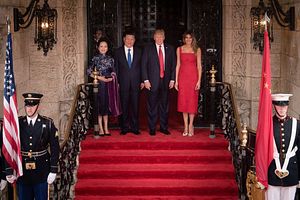China has shown a steady commitment to a peaceful rise, abandoning the revolutionary fervor of the Mao era and largely eschewing confrontation in favor of development. However, China is willing to risk war on key issues of security and sovereignty in its region, a fact that could complicate American diplomatic efforts in Korea, Taiwan, and the South China Sea.
In a trip to China last month as part of the Harvard Kennedy School’s U.S.-China Study Group, I visited Beijing, Chengdu, and Shanghai, meeting with ministry officials, provincial representatives, and think tanks. A key theme that emerged is that despite a focus on economic engagement as the cornerstone of its foreign policy, China has a “bottom line” on some regional issues that is inviolable. These include a Taiwanese move toward independence, an attempt at regime change in North Korea, and a continuation of the U.S. pivot to Asia.
Cong Song, Deputy Director-General for North America at the Ministry of Foreign Affairs, stated that from China’s perspective, Taiwan is the key issue in U.S.-China relations. The new Taiwanese president Tsai Ing-wen, who has challenged the One China principle, is “a disturbance to relations,” and has “taken a lot of de-Sinification measures to negate Chinese history.” On this core interest, Cong cautioned, “do not sell any advanced weapons to Taiwan, do not send any high-level officials to Taiwan, otherwise it’s going to be a big problem.” Yet, the U.S. is currently planning a large weapons sale to Taiwan that could include advanced weaponry.
When it comes to North Korea, China appears to be taking the regime’s nuclear and ballistic missile tests more seriously, hoping to avoid a destabilizing war. Shen Yamei, Deputy Director at the China Institute of International Studies, noted, “For the U.S. [North Korea] is an issue of primacy… but for China it is a matter of neighborhood stability.” With some North Korean nuclear sites only 70 miles from the Chinese border, China also views radiation fallout from an accident or attack on the reactors as a security concern.
According to Cong, Chinese policy is “peaceful resolution through negotiation. No war, no chaos, and denuclearization” of the peninsula. To restart talks, China has proposed a “dual track” solution in which North Korea ceases weapons tests while the U.S. and South Korea cease regional military exercises. So far, this initiative has gained little traction. Surprisingly, Cong suggested that, “What the North Koreans want most is normalization of the relationship between the U.S. and North Korea.”
Cong argued that China has pressured North Korea to abandon its weapons program, and views the apparent halt of its anticipated sixth nuclear test as a success of this policy. However, multiple officials suggested that China’s ability to persuade Kim Jong-un is limited. Shen pointed to lingering distrust from China’s formal recognition of South Korea in 1992, and Cong noted that China was harshly criticized in North Korean media when it called for an end to missile and nuclear tests.
China is ultimately opposed to aggressive sanctions, and Cong suggested that the first priority is “to get a real peace treaty” to replace the current armistice. Following that, a long-term solution might feature security guarantees from the U.S., China, and Russia that would assuage the North enough the surrender its nukes.
One thing that was imminently clear was that a foreign invasion of North Korea was unacceptable to China. Dr. Yang Jiemian, President Emeritus of the Shanghai Institute for International Studies said that any attempt to cross the 38th parallel would violate China’s “bottom line” and provoke a forceful response.
The final issue of contention is the U.S. rebalancing toward Asia, which China views as a security threat. According to Shen, former President Obama’s pivot destabilized the region by altering its balance of power, and current President Trump’s proposed $54 billion Pentagon budget increase would send even more weapons systems to the region. This perceived threat is at least one potential contributor to the significant military buildup China has undergone.
Interestingly, the dispute over China’s land reclamation projects in the South China Sea, which have spurred concern in the U.S. and antagonism among its neighbors, is not considered a particularly serious problem. Yang hinted at a long time-horizon on the dispute, noting, “It took 70 years for China to solve the borderland boundary issues [with its landed neighbors], it might take 50 or 100 years or more to solve the maritime issues.” The recent reconciliation achieved with the Philippines under President Rodrigo Duterte also suggests to China that the maritime disputes can take a back seat to shared economic development objectives.
The American and Chinese perspectives differ fundamentally on East Asian regional issues. China for example views the South China Sea as an “issue between China and its neighbors, not China and the U.S.,” and believes “China is not focal point of the North Korea problem – the key to solving this issue lies in the hands of North Korea and the U.S.”
Recognizing these contrary perspectives — and the complex historical and cultural realities throughout the region — will be crucial in effectively navigating the thorny negotiations that will inevitably be needed to denuclearize North Korea, maintain the status quo in Taiwan, and arrive at an acceptable agreement in the South China Sea.
Enea Gjoza is a fellow at Defense Priorities and Master in Public Policy candidate at the Harvard Kennedy School of Government, where he is also a Belfer IGA Student Fellow. Prior to attending HKS, Enea was a policy analyst at the Charles Koch Institute, where he worked on developing new approaches to U.S. foreign policy and grand strategy.

































